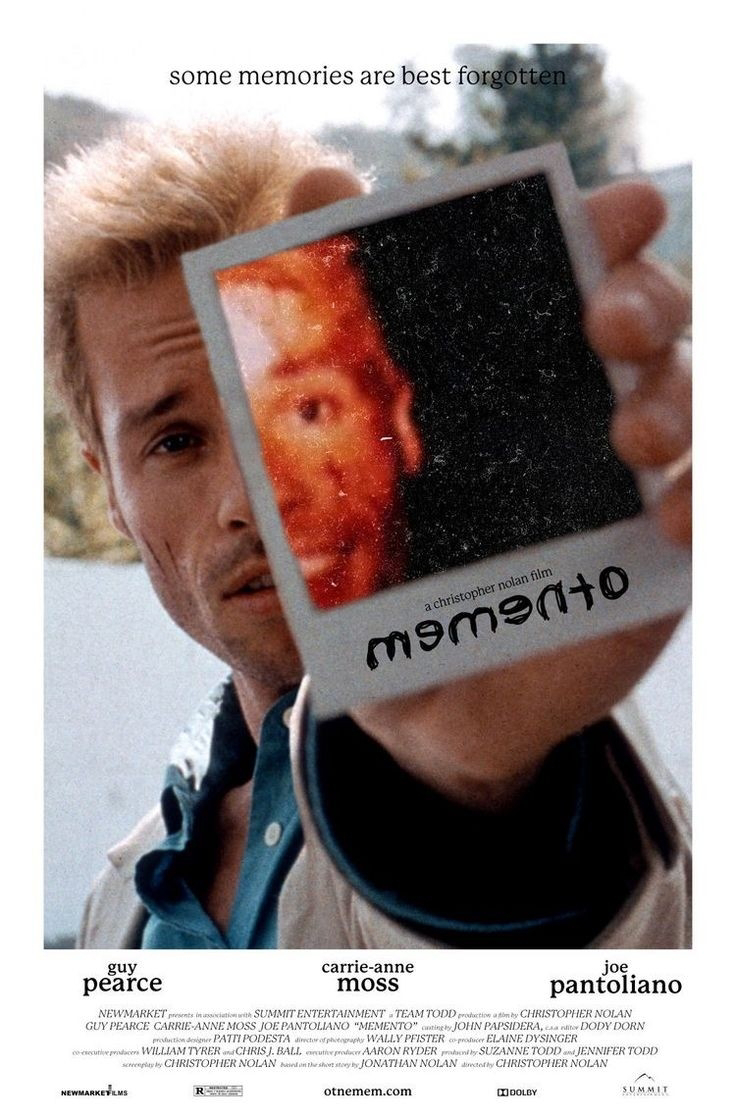MEMENTO 2000 Christopher Nolan
"Memento" tells the story of Leonard Shelby (Guy Pearce), a man suffering from anterograde amnesia, a condition that prevents him from forming new memories. Leonard is on a quest to find the man who he believes raped and murdered his wife. He uses a system of Polaroid photographs, handwritten notes, and tattoos to track information he cannot remember. The film’s narrative structure is unique, unfolding in reverse chronological order, which immerses the audience in Leonard’s fragmented perception of reality.
Christopher Nolan’s direction is masterful in "Memento," particularly in how he handles the film's complex structure. The reverse narrative forces viewers to piece together the story alongside Leonard, creating a sense of disorientation and confusion that mirrors his condition. This innovative storytelling technique is both a narrative and a thematic device, effectively drawing the audience into Leonard’s struggle to distinguish truth from deception. Nolan’s choice to alternate between black-and-white and color sequences enhances the disjointed timeline, with the black-and-white scenes providing exposition and context that gradually align with the color sequences as the film progresses.
Guy Pearce delivers a compelling performance as Leonard Shelby. His portrayal captures the vulnerability, frustration, and determination of a man grappling with a debilitating condition while on a relentless quest for vengeance. Pearce’s nuanced acting ensures that Leonard is both sympathetic and enigmatic. Carrie-Anne Moss and Joe Pantoliano provide strong support as Natalie and Teddy, respectively. Moss’s character adds layers of ambiguity, as her motivations are as difficult to decipher as Leonard’s memory. Pantoliano’s performance as Teddy brings a necessary tension and unpredictability to the narrative, serving as a catalyst for many of the film’s twists and turns.
"Memento" explores profound themes such as memory, identity, and the subjective nature of reality. The film questions the reliability of memory and suggests that identity is intricately tied to our ability to remember our past. Leonard’s tattoos and notes serve as symbols of his desperate attempt to construct a coherent sense of self and reality. The film also delves into the idea of truth and deception, both self-imposed and external. Leonard’s quest is not just about finding his wife’s killer but also about grappling with his own understanding of his life and actions.
Wally Pfister’s cinematography is instrumental in creating the film’s distinct atmosphere. The use of lighting and composition effectively conveys the mood of uncertainty and suspense. The juxtaposition of black-and-white and color scenes not only aids in distinguishing the timelines but also accentuates the psychological depth of Leonard’s experience. Dody Dorn’s editing is critical in maintaining the coherence of the film’s reverse structure. The seamless transitions between scenes and timelines ensure that the audience remains engaged and invested in unraveling the plot.
David Julyan’s score complements the film’s tone, enhancing the tension and emotional weight of Leonard’s journey. The music is understated yet impactful, often relying on minimalistic and haunting melodies to underscore key moments. The sound design is equally meticulous, with ambient sounds and dialogue playing crucial roles in immersing the audience in Leonard’s fragmented world.
"Memento" is a groundbreaking film that showcases Christopher Nolan’s ingenuity as a storyteller and filmmaker. Its unconventional narrative structure, combined with strong performances and thematic depth, makes it a compelling and intellectually stimulating experience. The film’s exploration of memory and identity resonates long after the credits roll, inviting viewers to question the nature of truth and the human condition. "Memento" is not just a movie; it is a cinematic puzzle that challenges and rewards its audience with each viewing.





Comments
Post a Comment